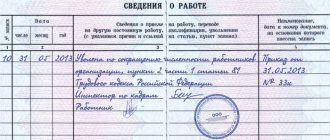How to write a refusal letter (with examples)
I have a friend who appraises antiques.
That is, he gives a price in rubles for some old Chinese vase in which some Aunt Frosya kept pencils. He says the hardest part of his job (and the part he fears the most) is telling people that their treasure is worthless. We all know how to empathize. I also feel awkward when I explain to another applicant that his resume, ideas or qualifications are not good enough for the job for which he is applying.
Writing a refusal is not an easy task for any of us. And it doesn't depend on who you're dealing with. A job candidate, an entrepreneur whose project you have no intention of funding, or a supplier whose services you no longer need. Most of us have a hard time saying no. It is unpleasant. So many people put this matter off or do nothing at all, giving way to silence. And yet, we miss opportunities this way. Although painful, quitting has its benefits. An interesting study was once conducted. It turns out that when a company is open about what ideas it doesn't like (rather than just passively ignoring), the quality of other ideas and employee engagement increase.
There is one important thing that I have learned over the years: the first thing you get is not always the best. During this time, I rejected thousands of ideas, drafts and applications. And now, looking back, I see that I was right. So refuse, refuse and refuse again.
Basic refusal letter template
Writing a good disclaimer takes a lot of time—especially at first. However, this is good. Working on a letter like this forces you to think clearly. You begin to clearly define what you want from other people and what your organization really needs. An example with articles in the online publication where I work. Most rejections can be categorized into one of five categories: the information is too abstract (and therefore not very useful to readers); repeat information that we have already published; inappropriate presentation style; obvious and intrusive advertising; dubious information not supported by sufficient evidence or experience. Thanks to this classification, we were able to identify key principles, as well as a set of requirements for articles and their authors. This saves time and makes fewer mistakes.
However, the refusal letter should not be long. And the reason why you refuse does not have to be described in all details. If you have never met a person and all your communication consisted of email correspondence, you can generally get by with a few lines. After analyzing some refusal letters, we can identify some patterns. They are usually compiled according to the following plan:
- Give thanks.
- Report refusal.
- Describe the main reason for refusal.
- Give hope.
For example:
Dear Petr Petrovich,
Thank you for your response and patience while waiting for our response. I'm afraid we will have to refuse your work. We've posted a lot of articles about cybersecurity lately, and unfortunately, the texts you offer overlap with other materials we've published, without giving the reader new information. We hope you find a good place to publish your work.
Best wishes,
[Your name or organization name]
If it was a refusal to a person who was being interviewed for a vacancy. The format is generally similar to the previous one, but slightly edited:
Dear Kallistrat Modestovich,
Thank you for taking the time to come to the interview last week. While I enjoyed our conversation, I think we need someone with more practical project management experience. I hope you find a suitable job in the near future.
[Your name]
If you can't figure out how to "give hope" at the end, don't do it. Don't say anything that might give the recipient the impression that the door is still open. Such clarity and finality may seem too harsh. However, adding more words to “soften the blow” will only waste false hope. And false hope is always more cruel than no hope at all. It encourages the other person to spend more time. Both yours and mine.
If the idea of ending a letter with an uncompromising refusal is not to your taste, you can end it with gratitude. Let's look at an example of a refusal letter addressed to a supplier:
Dear Emelyan Benediktovich,
Thanks for the detailed proposal. Looking at the materials provided, it appears that your organization's key strengths do not quite align with what we need for this project. Thank you again for taking the time to put this proposal together for us.
Best wishes,
[Your name]
More detailed refusal letter
But what if the future recipient was actually close to your desired requirements and you might want to work with them in the future? Or have you already collaborated with him? In this case, the above examples would be too cold and impolite. When I write a refusal to people with whom I would like to maintain a positive relationship, I use the same letter format. However, I explain in much more detail why I reject their offer. In addition, I am more open with them and openly encourage the person to try again.
The letter should also emphasize that you are sincerely interested and not just brushing it off with an empty promise. Here's an example:
Dear Lukum Marzipanovich,
Thank you for your response and patience while waiting for our response. I'm afraid we will have to refuse your work. We've posted a lot of articles about cybersecurity lately, and unfortunately, the texts you offer overlap with other materials we've published, without giving the reader new information. For example, take a look at an article published on August 6 by programmer Mikhail Likhachev, as well as an article published on August 16 by the CEO of Acme Corp. Although we will not be able to publish your submissions, we really liked your writing style and the way you support your arguments with research references. Please let me know if you are interested in sending us some of your other articles in the future?
Sincerely,
[Your name or organization name]
For an applicant who has passed the interview, the refusal may look like this:
Dear Ariadna Poseidonovna,
Thank you for taking the time to interview us last week. We are sorry that your candidacy did not reach the next stage; this position was very competitive. At this point, our organization really needs someone with extensive project management experience. However, I really enjoyed our conversation and I think that you could fit in well with our work team. Please stay in touch. If you don't mind, I'll tell you about upcoming vacancies in our company. Perhaps some of them will interest you.
All the best,
[Your name]
Now the option for the supplier:
Dear Ilya Vladimirovich,
We are lucky to have received such interesting offers from you. And we deeply appreciate all the information provided from your side. After much deliberation, we decided to enter into a contract with another company specifically for this project. Despite the fact that we have no doubt about the excellent quality of your products, we decided to use this project to expand the list of partners. Since the project is experimental, it was a good opportunity for this.
We would like to continue working with you on future projects that we plan to launch this year. I definitely look forward to collaborating in the future.
Thanks again for your help and your time,
[Your name]
The longer or more closely you work with someone, the more information you give them when they say no. A smart recipient will use this information to come back to you with a stronger offer next time. In my practice, there have been several cases when recipients thanked me for rejection letters. Because these letters acted as feedback and gave them the specific information they needed to collaborate in the future. This is a good reminder that people appreciate constructive criticism.
Terms and cost of issuing refusal letters
The standard period for checking documents and issuing a refusal letter does not exceed 1-3 days. This period may increase if additional documents are required for verification, or if specialists clarify the country of origin of the goods. When accompanied by our specialists, you will receive a letter as quickly as possible and will be able to quickly resolve problems during the import and sale of products. You can find out the prices for issuing refusal letters for your goods by calling the numbers listed on the website.
Having a waiver letter will help you avoid problems during Rospotrebnadzor inspections in trade
Refusal letter with which you do not agree
It is especially difficult to decide to refuse when you do not agree with this refusal. Maybe you competed for a job candidate because you thought he was more qualified than others. Perhaps you insisted on working with this particular supplier, but the executive committee considered it too expensive. I myself have defended articles that other editors thought were not ready for publication. Not a very pleasant feeling.
When this happens, there is a temptation to passively hide behind the decisions of others. For example: “It has been decided to reject your proposal” or “Our management has decided to go in a different direction.” Resist this temptation. There is nothing simpler than this strategy. However, it undermines your authority as a decision maker.
If you are the one writing the rejection, be the owner of that rejection. To be fair, the letter should say something like: “After much discussion and doubt, we decided on X” or “It was a very difficult decision, but ultimately we decided on Y.” It is worth emphasizing: write “we”, not “they”.
A rejection letter in which you hide behind someone else's skirt hinders your ability to make helpful comments. It also makes the organization seem unserious, which will undermine other people's desire to work with you in the future.
Whom do we remove from work?
In accordance with paragraph 2 of Art.
5 of Federal Law No. 157 of September 17, 1998 “On Immunoprophylaxis of Infectious Diseases”, the absence of preventive vaccinations entails refusal to hire or removal of citizens from work, the performance of which is associated with a high risk of contracting infectious diseases. The list of works, the performance of which is associated with a high risk of infectious diseases and requires mandatory preventive vaccinations, was approved by Decree of the Government of the Russian Federation of July 15, 1999 No. 825 (hereinafter referred to as the List).
If an organization operates in areas where vaccination is mandatory according to the List, the employer is obliged to remove from work an employee who refuses to be vaccinated.
In addition, if there is a threat of the emergence and spread of infectious diseases that pose a danger to others (including the new coronavirus infection), the chief state sanitary doctors of the constituent entities of the Russian Federation are empowered to issue reasoned decisions on carrying out preventive vaccinations for citizens or certain groups of citizens according to epidemic indications.
Thus, 60% of employees of Moscow organizations are required to get vaccinated - Decree of the Chief State Sanitary Doctor for the city of Moscow E.E. Andreeva dated June 15, 2021 No. 1 “On carrying out preventive vaccinations for certain groups of citizens for epidemic indications”, Decree of the Moscow Mayor dated June 16, 2021 No. 32-UM.
This applies to the following areas of activity:
- trade;
- beauty salons, cosmetics, spa salons, massage parlors, solariums, baths, saunas, fitness centers, fitness clubs, swimming pools;
- household services, including laundries, dry cleaning and other similar services;
- catering;
- client divisions of financial organizations, postal service organizations;
- MFC;
- public transport, taxi;
- education, health, social protection and social services;
- housing and communal services and energy;
- cultural, exhibition, educational events, including museums, exhibition halls, libraries, lectures, trainings (with the exception of official events organized by executive authorities);
- leisure, entertainment, entertainment events, including gaming events, master classes;
- children's playrooms, children's entertainment centers, children's day camps, other places where similar events are held for minors in buildings, structures, structures (premises in them), including in cultural and recreation parks, shopping and entertainment centers;
- theaters, cinemas, concert halls;
- mass physical education and sports events.
Mandatory vaccination also applies to civil servants, municipal employees, employees of Moscow city authorities and organizations subordinate to them.
Refusal to vaccinate for epidemic reasons will result in the removal from work of citizens who have not been vaccinated.
Read on topic:
Refusal of an employee to be vaccinated. What to do to avoid being fined?









